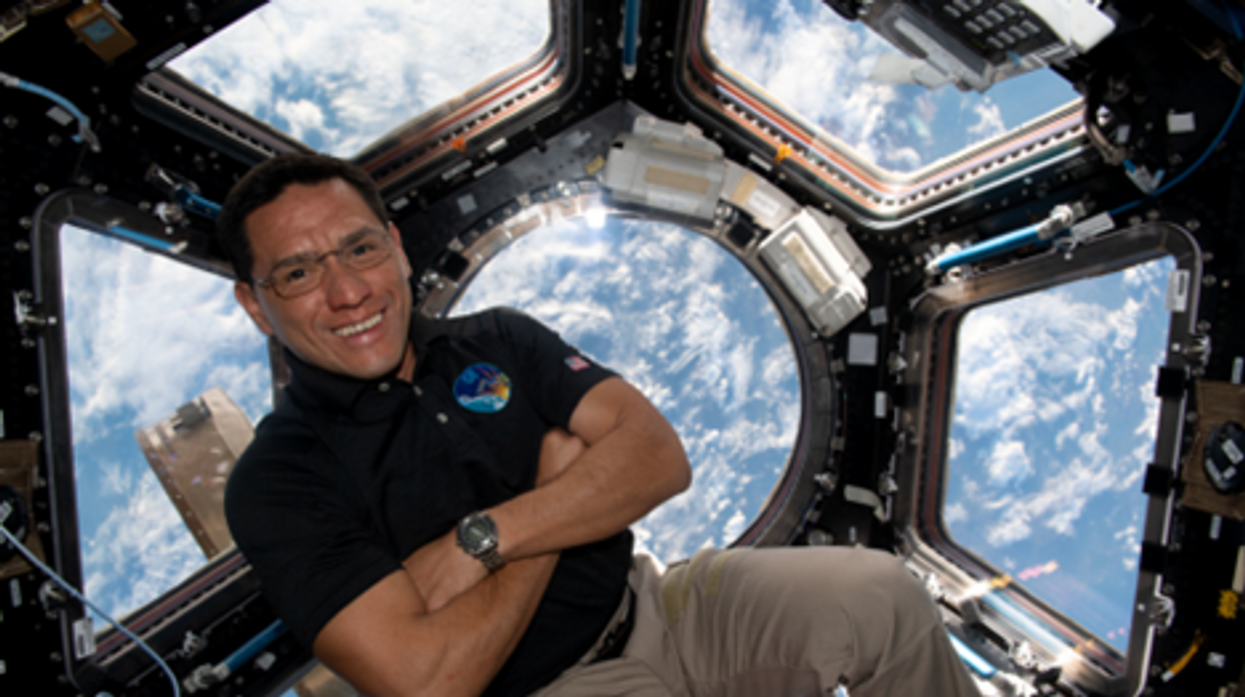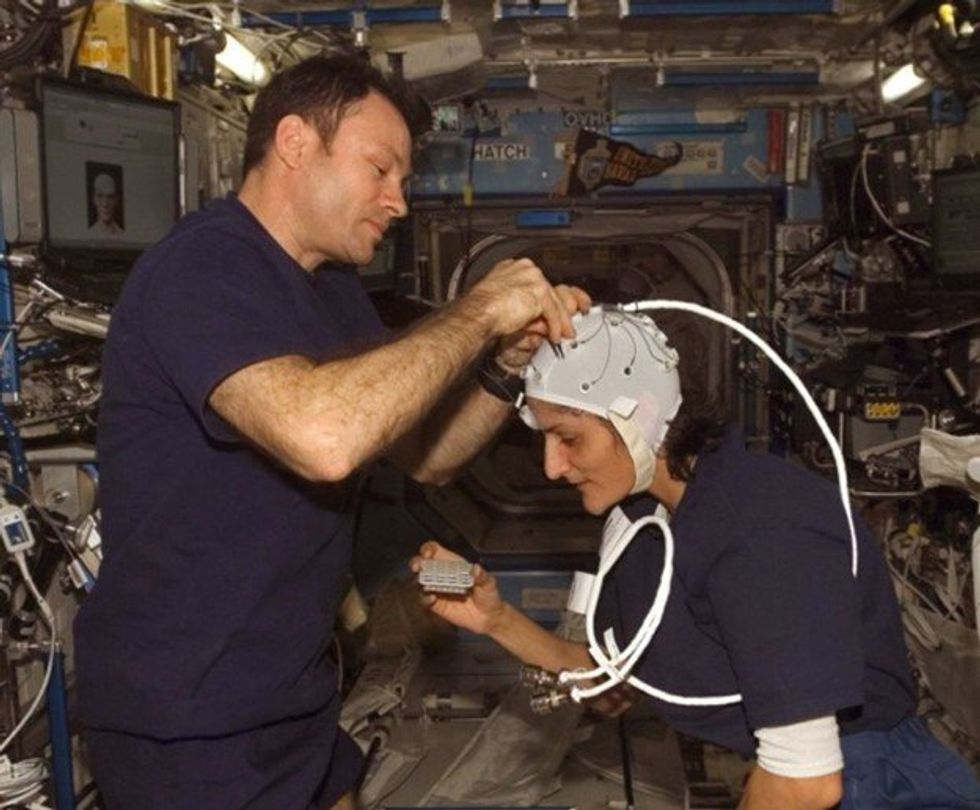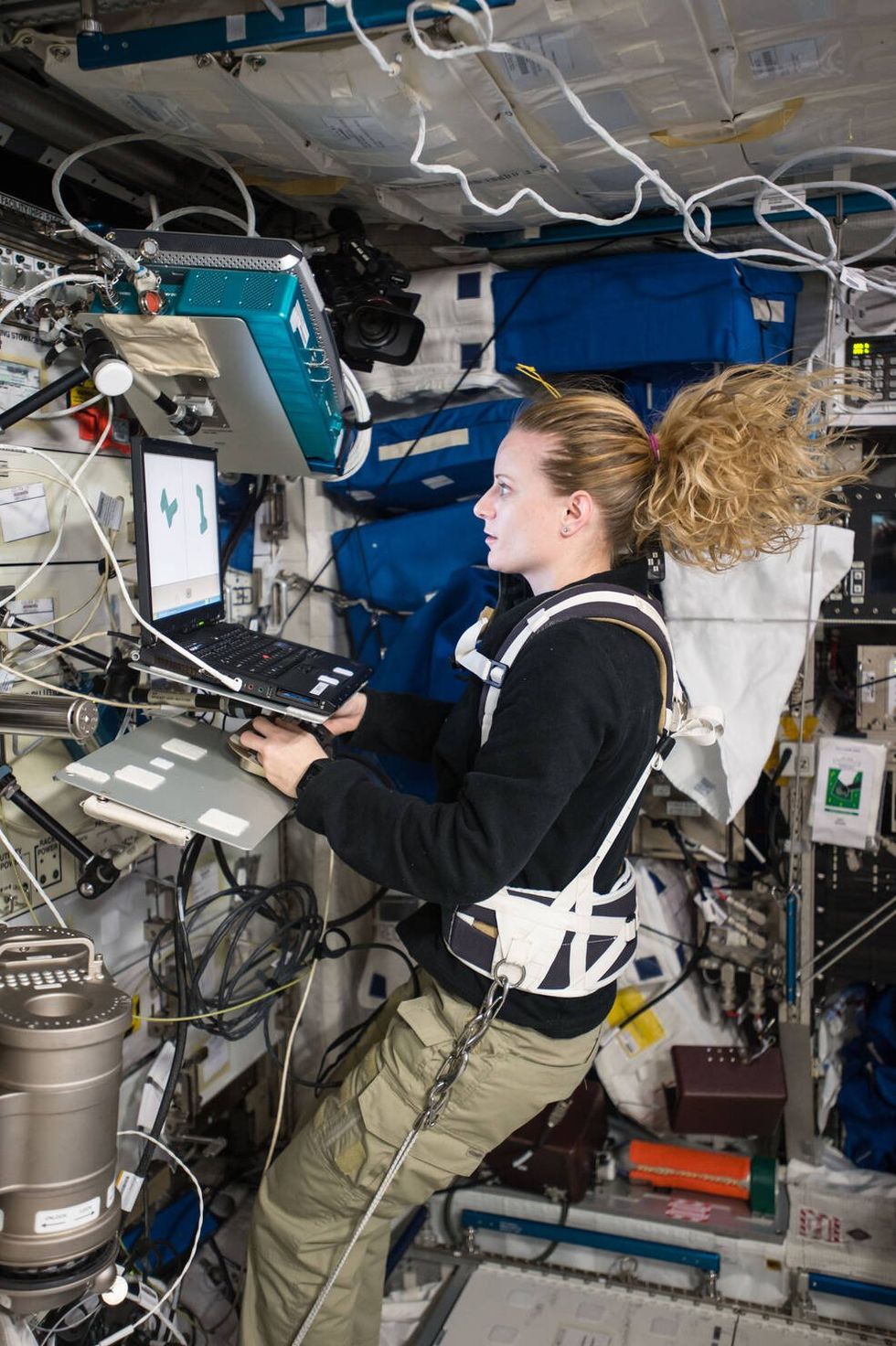After spaceflight record, NASA looks to protect astronauts on even longer trips

NASA astronaut Frank Rubio floats by the International Space Station’s “window to the world.” Yesterday, he returned from the longest single spaceflight by a U.S. astronaut on record - over one year. Exploring deep space will require even longer missions.
At T-minus six seconds, the main engines of the Atlantis Space Shuttle ignited, rattling its capsule “like a skyscraper in an earthquake,” according to astronaut Tom Jones, describing the 1988 launch. As the rocket lifted off and accelerated to three times the force of Earth's gravity, “It felt as if two of my friends were standing on my chest and wouldn’t get off.” But when Atlantis reached orbit, the main engines cut off, and the astronauts were suddenly weightless.
Since 1961, NASA has sent hundreds of astronauts into space while working to making their voyages safer and smoother. Yet, challenges remain. Weightlessness may look amusing when watched from Earth, but it has myriad effects on cognition, movement and other functions. When missions to space stretch to six months or longer, microgravity can impact astronauts’ health and performance, making it more difficult to operate their spacecraft.
Yesterday, NASA astronaut Frank Rubio returned to Earth after over one year, the longest single spaceflight for a U.S. astronaut. But this is just the start; longer and more complex missions into deep space loom ahead, from returning to the moon in 2025 to eventually sending humans to Mars. To ensure that these missions succeed, NASA is increasing efforts to study the biological effects and prevent harm.
The dangers of microgravity are real
A NASA report published in 2016 details a long list of incidents and near-misses caused – at least partly – by space-induced changes in astronauts’ vision and coordination. These issues make it harder to move with precision and to judge distance and velocity.
According to the report, in 1997, a resupply ship collided with the Mir space station, possibly because a crew member bumped into the commander during the final docking maneuver. This mishap caused significant damage to the space station.
Returns to Earth suffered from problems, too. The same report notes that touchdown speeds during the first 100 space shuttle landings were “outside acceptable limits. The fastest landing on record – 224 knots (258 miles) per hour – was linked to the commander’s momentary spatial disorientation.” Earlier, each of the six Apollo crews that landed on the moon had difficulty recognizing moon landmarks and estimating distances. For example, Apollo 15 landed in an unplanned area, ultimately straddling the rim of a five-foot deep crater on the moon, harming one of its engines.

Spaceflight causes unique stresses on astronauts’ brains and central nervous systems. NASA is working to reduce these harmful effects.
NASA
Space messes up your brain
In space, astronauts face the challenges of microgravity, ionizing radiation, social isolation, high workloads, altered circadian rhythms, monotony, confined living quarters and a high-risk environment. Among these issues, microgravity is one of the most consequential in terms of physiological changes. It changes the brain’s structure and its functioning, which can hurt astronauts’ performance.
The brain shifts upwards within the skull, displacing the cerebrospinal fluid, which reduces the brain’s cushioning. Essentially, the brain becomes crowded inside the skull like a pair of too-tight shoes.
That’s partly because of how being in space alters blood flow. On Earth, gravity pulls our blood and other internal fluids toward our feet, but our circulatory valves ensure that the fluids are evenly distributed throughout the body. In space, there’s not enough gravity to pull the fluids down, and they shift up, says Rachael D. Seidler, a physiologist specializing in spaceflight at the University of Florida and principal investigator on many space-related studies. The head swells and legs appear thinner, causing what astronauts call “puffy face chicken legs.”
“The brain changes at the structural and functional level,” says Steven Jillings, equilibrium and aerospace researcher at the University of Antwerp in Belgium. “The brain shifts upwards within the skull,” displacing the cerebrospinal fluid, which reduces the brain’s cushioning. Essentially, the brain becomes crowded inside the skull like a pair of too-tight shoes. Some of the displaced cerebrospinal fluid goes into cavities within the brain, called ventricles, enlarging them. “The remaining fluids pool near the chest and heart,” explains Jillings. After 12 consecutive months in space, one astronaut had a ventricle that was 25 percent larger than before the mission.
Some changes reverse themselves while others persist for a while. An example of a longer-lasting problem is spaceflight-induced neuro-ocular syndrome, which results in near-sightedness and pressure inside the skull. A study of approximately 300 astronauts shows near-sightedness affects about 60 percent of astronauts after long missions on the International Space Station (ISS) and more than 25 percent after spaceflights of only a few weeks.
Another long-term change could be the decreased ability of cerebrospinal fluid to clear waste products from the brain, Seidler says. That’s because compressing the brain also compresses its waste-removing glymphatic pathways, resulting in inflammation, vulnerability to injuries and worsening its overall health.
The effects of long space missions were best demonstrated on astronaut twins Scott and Mark Kelly. This NASA Twins Study showed multiple, perhaps permanent, changes in Scott after his 340-day mission aboard the ISS, compared to Mark, who remained on Earth. The differences included declines in Scott’s speed, accuracy and cognitive abilities that persisted longer than six months after returning to Earth in March 2016.
By the end of 2020, Scott’s cognitive abilities improved, but structural and physiological changes to his eyes still remained, he said in a BBC interview.
“It seems clear that the upward shift of the brain and compression of the surrounding tissues with ventricular expansion might not be a good thing,” Seidler says. “But, at this point, the long-term consequences to brain health and human performance are not really known.”

NASA astronaut Kate Rubins conducts a session for the Neuromapping investigation.
NASA
Staying sharp in space
To investigate how prolonged space travel affects the brain, NASA launched a new initiative called the Complement of Integrated Protocols for Human Exploration Research (CIPHER). “CIPHER investigates how long-duration spaceflight affects both brain structure and function,” says neurobehavioral scientist Mathias Basner at the University of Pennsylvania, a principal investigator for several NASA studies. “Through it, we can find out how the brain adapts to the spaceflight environment and how certain brain regions (behave) differently after – relative to before – the mission.”
To do this, he says, “Astronauts will perform NASA’s cognition test battery before, during and after six- to 12-month missions, and will also perform the same test battery in an MRI scanner before and after the mission. We have to make sure we better understand the functional consequences of spaceflight on the human brain before we can send humans safely to the moon and, especially, to Mars.”
As we go deeper into space, astronauts cognitive and physical functions will be even more important. “A trip to Mars will take about one year…and will introduce long communication delays,” Seidler says. “If you are on that mission and have a problem, it may take eight to 10 minutes for your message to reach mission control, and another eight to 10 minutes for the response to get back to you.” In an emergency situation, that may be too late for the response to matter.
“On a mission to Mars, astronauts will be exposed to stressors for unprecedented amounts of time,” Basner says. To counter them, NASA is considering the continuous use of artificial gravity during the journey, and Seidler is studying whether artificial gravity can reduce the harmful effects of microgravity. Some scientists are looking at precision brain stimulation as a way to improve memory and reduce anxiety due to prolonged exposure to radiation in space.
Other scientists are exploring how to protect neural stem cells (which create brain cells) from radiation damage, developing drugs to repair damaged brain cells and protect cells from radiation.
To boldly go where no astronauts have gone before, they must have optimal reflexes, vision and decision-making. In the era of deep space exploration, the brain—without a doubt—is the final frontier.
Additionally, NASA is scrutinizing each aspect of the mission, including astronaut exercise, nutrition and intellectual engagement. “We need to give astronauts meaningful work. We need to stimulate their sensory, cognitive and other systems appropriately,” Basner says, especially given their extreme confinement and isolation. The scientific experiments performed on the ISS – like studying how microgravity affects the ability of tissue to regenerate is a good example.
“We need to keep them engaged socially, too,” he continues. The ISS crew, for example, regularly broadcasts from space and answers prerecorded questions from students on Earth, and can engage with social media in real time. And, despite tight quarters, NASA is ensuring the crew capsule and living quarters on the moon or Mars include private space, which is critical for good mental health.
Exploring deep space builds on a foundation that began when astronauts first left the planet. With each mission, scientists learn more about spaceflight effects on astronauts’ bodies. NASA will be using these lessons to succeed with its plans to build science stations on the moon and, eventually, Mars.
“Through internally and externally led research, investigations implemented in space and in spaceflight simulations on Earth, we are striving to reduce the likelihood and potential impacts of neurostructural changes in future, extended spaceflight,” summarizes NASA scientist Alexandra Whitmire. To boldly go where no astronauts have gone before, they must have optimal reflexes, vision and decision-making. In the era of deep space exploration, the brain—without a doubt—is the final frontier.
The Friday Five Weekly Roundup in Health Research
In this week's Friday Five, the right facial expression for your mental health. Plus, can virtual reality reduce pain? Lab made blood vessels. Gene editing muscles to lower blood sugar. And a magic ingredient coming from exhaust vents.
The Friday Five covers five stories in research that you may have missed this week. There are plenty of controversies and troubling ethical issues in science – and we get into many of them in our online magazine – but this news roundup focuses on scientific creativity and progress to give you a therapeutic dose of inspiration headed into the weekend.
Listen on Apple | Listen on Spotify | Listen on Stitcher | Listen on Amazon | Listen on Google
Here are the promising studies covered in this week's Friday Five:
- The right facial expression for your mental health
- Can virtual reality reduce pain?
- Lab made blood vessels
- Gene editing muscles to lower blood sugar
- A magic ingredient coming from exhaust vents
Leaders at Google and other companies are trying to get workers to return to the office, saying remote and hybrid work disrupt work-life boundaries and well-being. These arguments conflict with research on remote work and wellness.
Many leaders at top companies are trying to get workers to return to the office. They say remote and hybrid work are bad for their employees’ mental well-being and lead to a sense of social isolation, meaninglessness, and lack of work-life boundaries, so we should just all go back to office-centric work.
One example is Google, where the company’s leadership is defending its requirement of mostly in-office work for all staff as necessary to protect social capital, meaning people’s connections to and trust in one another. That’s despite a survey of over 1,000 Google employees showing that two-thirds feel unhappy about being forced to work in the office three days per week. In internal meetings and public letters, many have threatened to leave, and some are already quitting to go to other companies with more flexible options.
Last month, GM rolled out a policy similar to Google’s, but had to backtrack because of intense employee opposition. The same is happening in some places outside of the U.S. For instance, three-fifths of all Chinese employers are refusing to offer permanent remote work options, according to a survey this year from The Paper.
For their claims that remote work hurts well-being, some of these office-centric traditionalists cite a number of prominent articles. For example, Arthur Brooks claimed in an essay that “aggravation from commuting is no match for the misery of loneliness, which can lead to depression, substance abuse, sedentary behavior, and relationship damage, among other ills.” An article in Forbes reported that over two-thirds of employees who work from home at least part of the time had trouble getting away from work at the end of the day. And Fast Company has a piece about how remote work can “exacerbate existing mental health issues” like depression and anxiety.
For his part, author Malcolm Gladwell has also championed a swift return to the office, saying there is a “core psychological truth, which is we want you to have a feeling of belonging and to feel necessary…I know it’s a hassle to come into the office, but if you’re just sitting in your pajamas in your bedroom, is that the work life you want to live?”
These arguments may sound logical to some, but they fly in the face of research and my own experience as a behavioral scientist and as a consultant to Fortune 500 companies. In these roles, I have seen the pitfalls of in-person work, which can be just as problematic, if not more so. Remote work is not without its own challenges, but I have helped 21 companies implement a series of simple steps to address them.
Research finds that remote work is actually better for you
The trouble with the articles described above - and claims by traditionalist business leaders and gurus - stems from a sneaky misdirection. They decry the negative impact of remote and hybrid work for wellbeing. Yet they gloss over the damage to wellbeing caused by the alternative, namely office-centric work.
It’s like comparing remote and hybrid work to a state of leisure. Sure, people would feel less isolated if they could hang out and have a beer with their friends instead of working. They could take care of their existing mental health issues if they could visit a therapist. But that’s not in the cards. What’s in the cards is office-centric work. That means the frustration of a long commute to the office, sitting at your desk in an often-uncomfortable and oppressive open office for at least 8 hours, having a sad desk lunch and unhealthy snacks, sometimes at an insanely expensive cost and, for making it through this series of insults, you’re rewarded with more frustration while commuting back home.
In a 2022 survey, the vast majority of respondents felt that working remotely improved their work-life balance. Much of that improvement stemmed from saving time due to not needing to commute and having a more flexible schedule.
So what happens when we compare apples to apples? That’s when we need to hear from the horse’s mouth: namely, surveys of employees themselves, who experienced both in-office work before the pandemic, and hybrid and remote work after COVID struck.
Consider a 2022 survey by Cisco of 28,000 full-time employees around the globe. Nearly 80 percent of respondents say that remote and hybrid work improved their overall well-being: that applies to 83 percent of Millennials, 82 percent of Gen Z, 76 percent of Gen Z, and 66 percent of Baby Boomers. The vast majority of respondents felt that working remotely improved their work-life balance.
Much of that improvement stemmed from saving time due to not needing to commute and having a more flexible schedule: 90 percent saved 4 to 8 hours or more per week. What did they do with that extra time? The top choice for almost half was spending more time with family, friends and pets, which certainly helped address the problem of isolation from the workplace. Indeed, three-quarters of them report that working from home improved their family relationships, and 51 percent strengthened their friendships. Twenty percent used the freed up hours for self-care.
Of the small number who report their work-life balance has not improved or even worsened, the number one reason is the difficulty of disconnecting from work, but 82 percent report that working from anywhere has made them happier. Over half say that remote work decreased their stress levels.
Other surveys back up Cisco’s findings. For example, a 2022 Future Forum survey compared knowledge workers who worked full-time in the office, in a hybrid modality, and fully remote. It found that full-time in-office workers felt the least satisfied with work-life balance, hybrid workers were in the middle, and fully remote workers felt most satisfied. The same distribution applied to questions about stress and anxiety. A mental health website called Tracking Happiness found in a 2022 survey of over 12,000 workers that fully remote employees report a happiness level about 20 percent greater than office-centric ones. Another survey by CNBC in June found that fully remote workers are more often very satisfied with their jobs than workers who are fully in-person.
Academic peer-reviewed research provides further support. Consider a 2022 study published in the International Journal of Environmental Research and Public Health of bank workers who worked on the same tasks of advising customers either remotely or in-person. It found that fully remote workers experienced higher meaningfulness, self-actualization, happiness, and commitment than in-person workers. Another study, published by the National Bureau of Economic Research, reported that hybrid workers, compared to office-centric ones, experienced higher satisfaction with work and had 35 percent more job retention.
What about the supposed burnout crisis associated with remote work? Indeed, burnout is a concern. A survey by Deloitte finds that 77 percent of workers experienced burnout at their current job. Gallup came up with a slightly lower number of 67 percent in its survey. But guess what? Both of those surveys are from 2018, long before the era of widespread remote work.
By contrast, in a Gallup survey in late 2021, 58 percent of respondents reported less burnout. An April 2021 McKinsey survey found burnout in 54 percent of Americans and 49 percent globally. A September 2021 survey by The Hartford reported 61 percent burnout. Arguably, the increase in full or part-time remote opportunities during the pandemic helped to address feelings of burnout, rather than increasing them. Indeed, that finding aligns with the earlier surveys and peer-reviewed research suggesting remote and hybrid work improves wellbeing.
Remote work isn’t perfect – here’s how to fix its shortcomings
Still, burnout is a real problem for hybrid and remote workers, as it is for in-office workers. Employers need to offer mental health benefits with online options to help employees address these challenges, regardless of where they’re working.
Moreover, while they’re better overall for wellbeing, remote and hybrid work arrangements do have specific disadvantages around work-life separation. To address work-life issues, I advise my clients who I helped make the transition to hybrid and remote work to establish norms and policies that focus on clear expectations and setting boundaries.
For working at home and collaborating with others, there’s sometimes an unhealthy expectation that once you start your workday in your home office chair, and that you’ll work continuously while sitting there.
Some people expect their Slack or Microsoft Teams messages to be answered within an hour, while others check Slack once a day. Some believe email requires a response within three hours, and others feel three days is fine. As a result of such uncertainty and lack of clarity about what’s appropriate, too many people feel uncomfortable disconnecting and not replying to messages or doing work tasks after hours. That might stem from a fear of not meeting their boss’s expectations or not wanting to let their colleagues down.
To solve this problem, companies need to establish and incentivize clear expectations and boundaries. They should develop policies and norms around response times for different channels of communication. They also need to clarify work-life boundaries – for example, the frequency and types of unusual circumstances that will require employees to work outside of regular hours.
Moreover, for working at home and collaborating with others, there’s sometimes an unhealthy expectation that once you start your workday in your home office chair, and that you’ll work continuously while sitting there (except for your lunch break). That’s not how things work in the office, which has physical and mental breaks built in throughout the day. You took 5-10 minutes to walk from one meeting to another, or you went to get your copies from the printer and chatted with a coworker on the way.
Those and similar physical and mental breaks, research shows, decrease burnout, improve productivity, and reduce mistakes. That’s why companies should strongly encourage employees to take at least a 10-minute break every hour during remote work. At least half of those breaks should involve physical activity, such as stretching or walking around, to counteract the dangerous effects of prolonged sitting. Other breaks should be restorative mental activities, such as meditation, brief naps, walking outdoors, or whatever else feels restorative to you.
To facilitate such breaks, my client organizations such as the University of Southern California’s Information Sciences Institute shortened hour-long meetings to 50 minutes and half-hour meetings to 25 minutes, to give everyone – both in-person and remote workers – a mental and physical break and transition time.
Very few people will be reluctant to have shorter meetings. After that works out, move to other aspects of setting boundaries and expectations. Doing so will require helping team members get on the same page and reduce conflicts and tensions. By setting clear expectations, you’ll address the biggest challenge for wellbeing for remote and hybrid work: establishing clear work-life boundaries.

